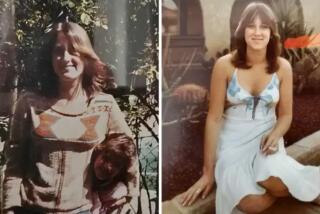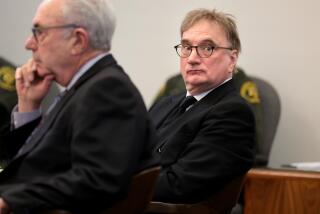Jury Urges Death Penalty for Serial Killer
- Share via
RIVERSIDE — Jurors deliberated only 10 minutes before recommending Friday that William L. Suff be executed for the serial murders of 12 Riverside County prostitutes between 1989 and 1991 and the attempted murder of a 13th woman.
The courtroom audience--filled to capacity with relatives of the dead women--erupted in cheers, and some cried.
Jurors said the decision was made easier for them after they learned, during the penalty phase of the trial, that Suff was convicted in 1974 in Texas for the beating death of his 2-month-old daughter. “Like the D.A. said, if he wasn’t a candidate for the death penalty, who was?” said juror Robert Murray outside the courtroom, where members of the victims’ families hugged jurors and one another.
“This has been very hard on the families but we’re very happy that justice has been done,” said Dina Zamora, the mother of one of the victims.
Riverside County Deputy Dist. Atty. Paul Zellerbach called Suff “the worst of the worst” for picking up prostitutes in the Riverside and Lake Elsinore areas, having sex with them, and then strangling or stabbing them to death, mutilating some and posing some of the bodies in lewd positions to shock their discoverers. On several occasions, he took his victims’ clothing or jewelry and gave them to his wife or friends.
One of Suff’s lawyers, Frank Peasley, said Suff was warned before the verdict was read to brace himself for the worst, given the quickness of the deliberations, but Suff still seemed surprised. “The look on his face, his body language--I couldn’t tell if he was in shock or maybe had wishful thinking. Or maybe it was just hearing those words-- death --that was a shock to him,” Peasley said.
Judge W. Charles Morgan set formal sentencing for Oct. 10. He has the option of reducing the sentence to life in prison without possibility of parole.
Suff, who turns 45 on Sunday, was an easygoing stock clerk for Riverside County, and even helped deliver office furniture to the law enforcement task force that was trying to hunt down the serial killer.
Frustrated police--who had interviewed prostitutes for clues, only to find some of them killed later--finally found one streetwalker who saw one of the victims get in Suff’s van, never to be seen again. Her description of the driver led to Suff’s arrest in January, 1992, when an alert Riverside police officer saw him talking to yet another prostitute and pulled him over. Inside the van, investigators found rope, a knife and other evidence that linked him to the 12 murders.
With no eyewitnesses to the murders, much of the prosecution’s case was based on microscopic evidence of threads, hairs and fibers, and DNA analysis of semen. But during the trial, a Lake Elsinore prostitute who escaped Suff’s grasp identified him as her assailant.
During the penalty phase, Zellerbach told of Suff’s conviction for the murder of his daughter in Texas 21 years ago, for which he served 10 years of a 70-year prison term, and said Suff was suspected of severely abusing another infant daughter in 1991.
Co-defense attorney Randy Driggs suggested to the jury that a life behind bars, where Suff “will worry about his next step, his next move and who’s behind him,” would be punishment enough.
But in his closing arguments, Zellerbach declared Suff “no longer a member of the human race . . . he has no heart, he has no soul and, by God, he has no conscience.”
More to Read
Sign up for Essential California
The most important California stories and recommendations in your inbox every morning.
You may occasionally receive promotional content from the Los Angeles Times.













